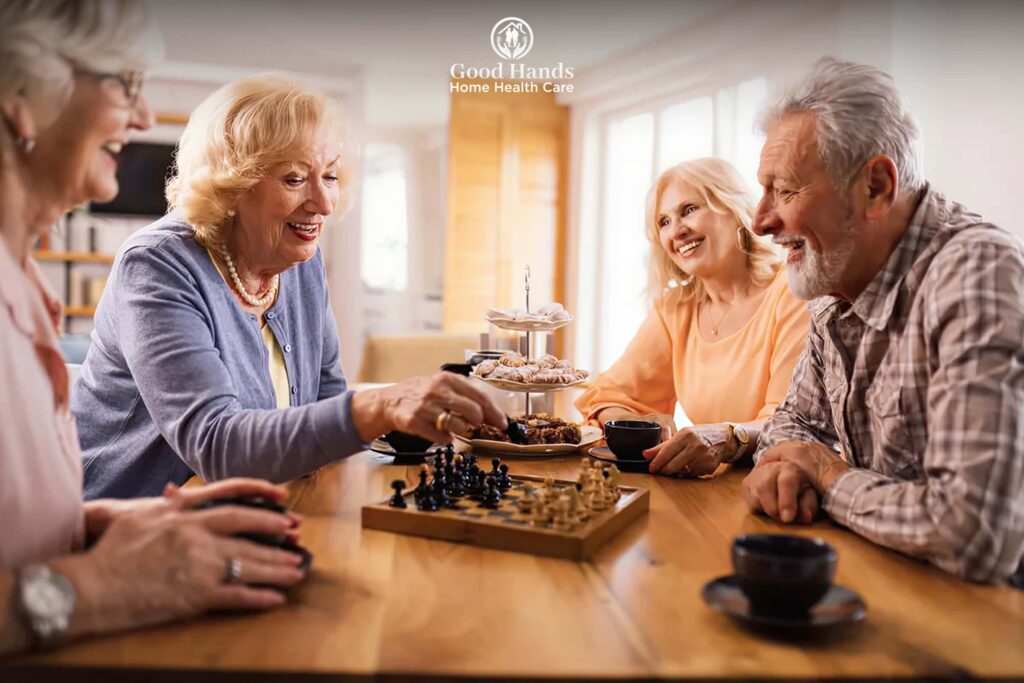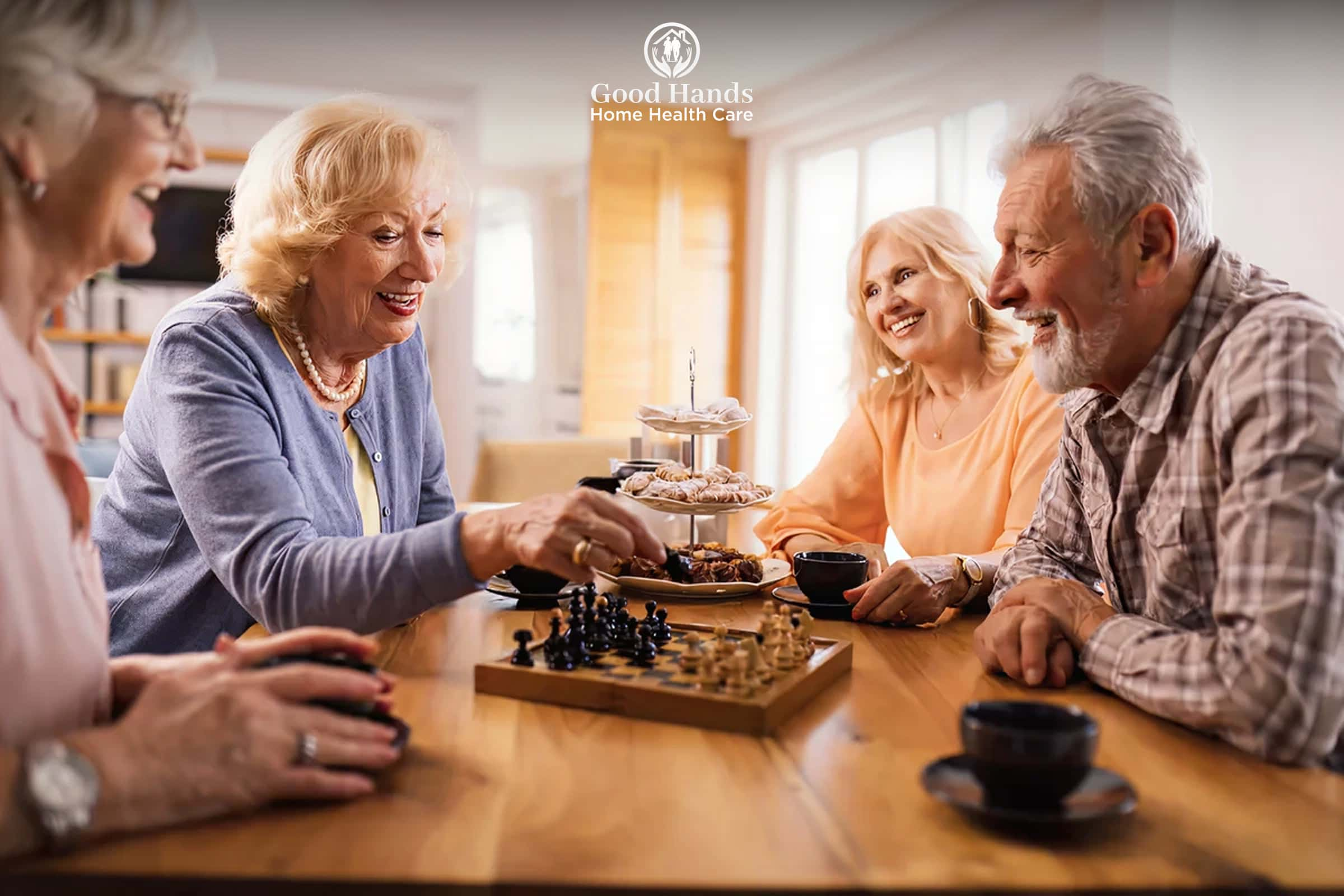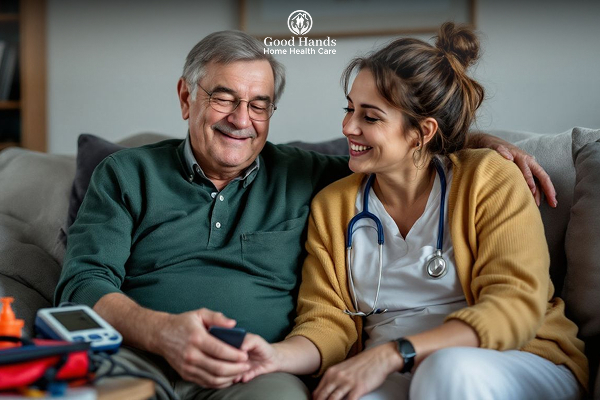Blog

Brain Exercises for Seniors: Stay Sharp and Focused

Brain Exercises for Seniors: Stay Sharp and Focused
Maintaining mental vitality becomes increasingly crucial as we journey through our later years. At Good Hands Home Health Care, we’ve compiled research-backed strategies to enhance memory capabilities, heighten concentration, and fortify cognitive resilience through natural methods. These carefully selected brain exercises for seniors can significantly contribute to preserving independence and experiencing a rich, fulfilling life throughout your golden years.
Why Brain Health Matters After 60
Cognitive function naturally evolves with age, but this doesn’t mean decline is inevitable or irreversible. Consistent intellectual engagement can remarkably decelerate these changes while safeguarding neural well-being. Implementing effective cognitive health tips can be transformative in preserving robust thinking abilities.
The aging journey might bring about gradual changes like delayed recall, diminished attention span, and slower problem-solving capabilities. While certain changes represent normal aging, others might indicate more concerning conditions. Risk factors significantly increase with limited physical activity, reduced social interaction, and suboptimal nutrition. Implementing strategies to prevent dementia naturally through dedicated mental exercise becomes fundamental, particularly when initiated early in the aging process.
Best Brain Exercises for Seniors
Regular participation in intellectual challenges reinforces neural pathways and maintains cognitive flexibility throughout the aging journey. Optimal activities target diverse thinking skills while simultaneously providing enjoyment and a sense of accomplishment.
Effective Mental Workouts:
- Puzzles and Logic Games: Crosswords, Sudoku, and word-finding activities invigorate logical thinking, vocabulary expansion, and memory retrieval systems.
- Memory and Matching Games: Traditional card games like concentration or their digital counterparts exercise recall mechanisms.
- Learn Something New: Exploring a musical instrument, an unfamiliar language, or an artistic craft establishes completely new neural connections.
The advantage of brain games for aging adults lies in their adaptability and easy access. Difficulty can be tailored to match your current abilities, with gradual increases in complexity to encourage ongoing development and neural growth.
Everyday Activities That Boost Brain Function
Specialized equipment or formal instruction isn’t necessary—many cognition-enhancing activities likely already exist within your daily routine and can deliver the meaningful mental stimulation seniors need on a regular basis.
Engaging with books, participating in current event discussions, or absorbing informative podcasts activates multiple cognitive regions simultaneously. Written expression and journaling stimulate recollection processes and analytical thinking while organizing thoughts coherently. Even routine tasks such as meal preparation or tending to plants require sequential thinking, problem resolution, and careful attention—all excellent approaches to improve memory in elderly individuals through practical, real-world application rather than abstract exercises.
Lifestyle Habits That Support Cognitive Health
Cognitive wellness doesn’t function in isolation—it’s deeply intertwined with holistic health. Small, consistent daily practices create a profound impact over time through faithful adherence to key wellness principles.
Consistent physical movement increases cerebral circulation, delivering vital oxygen and nutrients essential for optimal brain performance. Even gentle activities like neighborhood walks, water exercises, or chair-adapted yoga elevate mood while supporting information retention capabilities. Nutritional choices play an equally significant role—incorporating brain-nourishing foods such as dark leafy vegetables, antioxidant-rich berries, omega-rich fish, and nutrient-dense nuts provides protective compounds that shield neural tissue. Implementing cognitive health tips like maintaining appropriate hydration levels and moderating alcohol intake can also yield substantial benefits. Quality sleep remains absolutely fundamental, facilitating memory consolidation and cellular repair processes, helping preserve intellectual capacity over extended periods.
Social and Emotional Stimulation
The relationship between social engagement and cognitive health cannot be overemphasized. Regular human interaction provides some of the most effective intellectual enrichment older adults can experience, engaging multiple cognitive processes simultaneously while alleviating stress and combating isolation.
Connection Opportunities:
- Community Engagement: Participate in neighborhood gatherings, join interest-based groups, or contribute time to meaningful causes.
- Interactive Games: Traditional board games, card activities, and collaborative puzzles combine strategic thinking with valuable social interaction.
- Mindfulness Practices: Meditation and present-moment awareness techniques reduce harmful stress hormones while enhancing attention capacity.
Good Hands Home Health Care understands that emotional well-being directly influences cognitive processing. Activities that generate joy and purpose create favorable neurochemistry that supports learning and recall functions. Finding effective ways to improve memory in elderly individuals often involves creating experiences worth remembering through meaningful human connections.
Digital Brain Training Tools for Seniors
Modern technology offers powerful options for structured cognitive enhancement that previous generations couldn’t access. Contemporary applications make mental exercises engaging while monitoring improvement over time, providing motivation through measurable progress.
Many digital brain games for aging adults feature scientifically designed challenges targeting specific cognitive domains. Programs such as Lumosity, Peak, Elevate, and BrainHQ deliver varied exercises appropriate for seniors across different ability levels. When selecting digital tools, finding appropriate challenge levels is essential—activities should stretch capabilities without causing excessive frustration. Most specialists recommend brief, consistent sessions rather than extended efforts; even 15-20 minutes of dedicated focus daily can produce noticeable improvements when practiced regularly.
When to Seek Help for Memory Concerns
Distinguishing between typical age-associated forgetfulness and more significant cognitive issues helps determine when professional assessment might be necessary. This awareness empowers seniors and caregivers to take appropriate action when needed.
Occasional memory lapses differ substantially from concerning patterns like persistent confusion, disorientation in familiar settings, or repeatedly asking identical questions. Should these signs appear, consulting healthcare professionals who specialize in cognitive wellness becomes important for proper evaluation. Neurological specialists can conduct comprehensive cognitive assessments and develop individualized care approaches. Remember that early intervention remains valuable—many therapeutic approaches can still enhance cognitive function even after some decline has occurred. Strategies to prevent dementia naturally are most effective when implemented before significant symptoms become apparent.
Final Tips for Lifelong Brain Health
Establishing a balanced routine supports cognitive vitality at every stage of aging, emphasizing consistency rather than perfection in your approach to brain wellness. Combining mental challenges with physical movement creates stronger benefits than either approach independently. Activities for mature minds work most effectively when smoothly integrated into everyday routines. Remember that consistency surpasses perfection—small daily efforts accumulate significantly over time. The most effective mental stimulation seniors can receive typically derives from enjoyable activities, as pleasure enhances both engagement and information retention. Select exercises you find genuinely rewarding, and maintaining the practice will develop naturally.
Ready to Support Your Brain Health Journey
At Good Hands Home Health Care, we’re committed to helping you maintain cognitive wellness. Reach out today to discover more about our senior brain health initiatives and customized support options.









